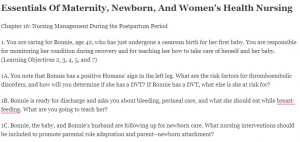Essentials Of Maternity, Newborn, And Women’s Health Nursing

Chapter 16: Nursing Management During the Postpartum Period
1. You are caring for Bonnie, age 42, who has just undergone a cesarean birth for her first baby. You are responsible for monitoring her condition during recovery and for teaching her how to take care of herself and her baby. (Learning Objectives 2, 3, 4, 5, and 7)
1A. You note that Bonnie has a positive Homans’ sign in the left leg. What are the risk factors for thromboembolic disorders, and how will you determine if she has a DVT? If Bonnie has a DVT, what else is she at risk for?
1B. Bonnie is ready for discharge and asks you about bleeding, perineal care, and what she should eat while breast-feeding. What are you going to teach her?
1C. Bonnie, the baby, and Bonnie’s husband are following up for newborn care. What nursing interventions should be included to promote parental role adaptation and parent–newborn attachment?
2. You have just received report on the following patient. Hannah G1P1 gave birth vaginally two days ago to a baby girl. She had a midline episiotomy and has protruding hemorrhoids. Hannah is rubella negative and has A– blood type and her daughter is O+. Hannah is breast-feeding her daughter. Hannah is expected to be discharged to home later this afternoon. (Learning Objectives 6 and 8)
2A. Describe the nursing management for Hannah and her family during the postpartum time period.
2B. Hannah and Justin are preparing for discharge. What areas of health education are needed for discharge planning, home care, and follow-up visits for Hannah and her baby girl?
Chapter 17: Newborn Transitioning
1. Sarah works in the labor and delivery unit as a transition nurse. Her department has instituted a new bedside transition period where newborns make the transition to extrauterine life in their mother’s recovery room about an hour after birth. Sarah’s next assignment is a new baby boy with Apgar scores of 8 and 9, born by cesarean about 1 hour ago to Lindsay, a 28-year-old G1. Sarah’s assessment findings of the new baby boy are:
- Vital signs: axillary temperature 37.0° C, heart rate 145, respiratory rate 75
- Observations: color pink, respirations rapid and unlabored, good muscle tone, good arm and leg movement
- Auscultation: breath sounds clear and equal bilaterally, strong heart sounds with a soft murmur, active bowel sounds in all four quadrants
- Physical assessment: fontanels soft and flat, eyes clear with red reflex in both, ears normal shape and placement, soft and hard palate intact, strong suck, both nares patent, capillary refill less than 2 seconds, both testes descended
- Measurements: weight 8 pounds 6 ounces, length 20 inches, head circumference 36.2 cm, chest circumference 36.0 cm
As Sarah is charting her findings, Lindsay asks Sarah if everything is OK with her baby. (Learning Objectives 2, 3, and 4)
- Which assessment findings for this newborn are abnormal? What is the most likely cause of these abnormal findings?
- How would Sarah explain these abnormal findings to Lindsay?
- Describe the nursing interventions that Sarah would implement based on these findings.
2. Baby girl Destiny was born by cesarean delivery 2 days ago. Destiny weighed 7 pounds 3 ounces, length 19 inches, head circumference 34 cm, chest circumference 34 cm. Her newborn course has been unremarkable. You observe that when held, Destiny appears alert and stares into her caregiver’s face. Destiny appears to be a content baby and cries only when she is hungry or when she needs a diaper change. When hungry, you observe that she brings her hand to her mouth and starts sucking on her fist and then begins to cry. Destiny falls asleep immediately after the feeding. The telephone, which is next to Destiny on her mother’s bed, rings loudly and Destiny does not appear to respond to the loud sound by moving her extremities or awakening briefly. (Learning Objective 5)
- Based on your observations of Destiny, are her behaviors normal? Which of the five typical behavioral responses were observed?
- Does Destiny exhibit any behaviors that may be cause for concern? What is the concern and what might you as the nurse do to assess further?